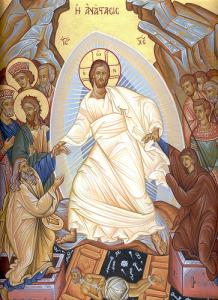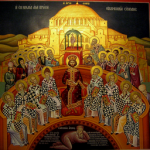 This Easter season I’ve been thinking about the message of the Resurrection in light of my recent reading of David Bentley Hart’s That All Shall Be Saved. This pugnaciously beautiful book has challenged my longstanding “hopeful universalism.” Hart claims that the kind of hope for universal salvation championed by Hans Urs von Balthasar is a weak compromise. Rather, he believes that Christians should affirm confidently that Jesus will save everyone. Anything less, Hart thinks, makes Christian theology incoherent and even immoral.
This Easter season I’ve been thinking about the message of the Resurrection in light of my recent reading of David Bentley Hart’s That All Shall Be Saved. This pugnaciously beautiful book has challenged my longstanding “hopeful universalism.” Hart claims that the kind of hope for universal salvation championed by Hans Urs von Balthasar is a weak compromise. Rather, he believes that Christians should affirm confidently that Jesus will save everyone. Anything less, Hart thinks, makes Christian theology incoherent and even immoral.
Hart never shrinks from overstating a point. I can’t agree with him that any non-universalist Christianity is reprehensible and untenable. Primarily this is because of the obvious fact that horrific evil exists in the world. To believe that God is good is to believe that God’s goodness is compatible with the existence of horrific evil. This is a question Hart has long wrestled with himself, rejecting traditional “theodicy.”
Hart’s answer is that God will completely overcome evil some day. But we don’t live in that day. We live in a world where evil continues to rage. It seems presumptuous to say that the only hope for the overcoming of evil we will entertain is one in which all evil people are redeemed. That seems to prioritize the redemption of the evil person over the harm done to their victims.
Making the best sense of the story
However, in a somewhat weaker form Hart’s argument is deeply compelling. Universal salvation makes the most sense of the Christian story. In light of Hart’s book and its converging lines of argument, I think that’s a hard conclusion to deny. At least, it’s hard to deny if we take the early Greek Fathers as our starting point.
Not all the Greek Fathers were universalists. Gregory of Nyssa, of course, was (in spite of the attempts of some conservative Orthodox to deny this). But even those who weren’t, or at least didn’t clearly affirm universalism, speak of salvation in a way that makes most sense if everyone is saved. They consistently speak of salvation in terms of the restoration of all creation to God and the redemption of all humanity from evil and death.
A universalist sermon by a non-universalist?
John Chryspstom’s famous Easter homily is a great example of this. Chrysostom is one of the Church Fathers whom practically nobody claims to have been a universalist. The homily may not have been written by him, to be sure, in which case perhaps the author was a universalist. But since it’s a part of the Easter liturgy of the Byzantine Rite (Orthodox or Catholic) and is commonly cited as a classic statement of the meaning of the Paschal mystery in the Western Church as well, whether Chrysostom actually wrote it isn’t the important point here. It’s clearly a text that the mainstream Catholic and Orthodox traditions regard highly and it expresses themes common throughout the Fathers. I’m sharing the version from the Orthodox Church in America‘s website:
If any man be devout and love God, let him enjoy this fair and radiant triumphal feast. If any man be a wise servant, let him rejoicing enter into the joy of his Lord. If any have labored long in fasting, let him now receive his recompense. If any have wrought from the first hour, let him today receive his just reward. If any have come at the third hour, let him with thankfulness keep the feast. If any have arrived at the sixth hour, let him have no misgivings; because he shall in nowise be deprived thereof. If any have delayed until the ninth hour, let him draw near, fearing nothing. If any have tarried even until the eleventh hour, let him, also, be not alarmed at his tardiness; for the Lord, who is jealous of his honor, will accept the last even as the first; He gives rest unto him who comes at the eleventh hour, even as unto him who has wrought from the first hour.
And He shows mercy upon the last, and cares for the first; and to the one He gives, and upon the other He bestows gifts. And He both accepts the deeds, and welcomes the intention, and honors the acts and praises the offering. Wherefore, enter you all into the joy of your Lord; and receive your reward, both the first, and likewise the second. You rich and poor together, hold high festival. You sober and you heedless, honor the day. Rejoice today, both you who have fasted and you who have disregarded the fast. The table is full-laden; feast ye all sumptuously. The calf is fatted; let no one go hungry away.
Enjoy ye all the feast of faith: Receive ye all the riches of loving-kindness. let no one bewail his poverty, for the universal kingdom has been revealed. Let no one weep for his iniquities, for pardon has shown forth from the grave. Let no one fear death, for the Savior’s death has set us free. He that was held prisoner of it has annihilated it. By descending into Hell, He made Hell captive. He embittered it when it tasted of His flesh. And Isaiah, foretelling this, did cry: Hell, said he, was embittered, when it encountered Thee in the lower regions. It was embittered, for it was abolished. It was embittered, for it was mocked. It was embittered, for it was slain. It was embittered, for it was overthrown. It was embittered, for it was fettered in chains. It took a body, and met God face to face. It took earth, and encountered Heaven. It took that which was seen, and fell upon the unseen.
O Death, where is your sting? O Hell, where is your victory? Christ is risen, and you are overthrown. Christ is risen, and the demons are fallen. Christ is risen, and the angels rejoice. Christ is risen, and life reigns. Christ is risen, and not one dead remains in the grave. For Christ, being risen from the dead, is become the first fruits of those who have fallen asleep. To Him be glory and dominion unto ages of ages. Amen.
I quote the whole thing because it’s relatively short and only by reading the whole do you get the universalist logic of the sermon. The first part of the sermon invites all to share in the feast, those who have prepared and those who haven’t. The second part explains why all are being invited so indiscriminately. Jesus’ death and resurrection have destroyed death for everyone and opened heaven to everyone. “Not one dead remains in the grave.”
Threats and promises
This is typical of the teaching and preaching of the Greek Fathers. When they talk about morality and exhort people, they thunder and threaten and speak of the flames of hell. But when they talk about the nature of salvation, they pretty consistently speak as if Jesus’ saving work affects the human race as a whole.
Of course it’s possible to read this as Western non-universalist “Arminians” do. And this is probably how most Orthodox do read it. Jesus has made salvation possible for everyone, but not everyone will choose to accept it. But it’s hard, once one has read Hart’s pungent arguments, not to see this as a weakening of the power of the Paschal Homily and other similar texts. If it really means “only the people who insist on being left in the grave are left there”–well, that’s not quite as triumphant, is it?
Still a hopeful universalist?
So I think I’m still a hopeful universalist after reading Hart (which will annoy his hardcore fans and would annoy him if he knew about it, but he’s only met me once and I don’t think he remembers me). But I’m a much more hopeful one. I used to say, “I believe in an eternal hell but I hope no one will chose to go there.” I would now say, “I believe the Christian story makes most sense if everyone is eventually saved, but it’s possible there’s something I’m missing.”
Given the existence of horrific evil, I hesitate to be too confident in my extrapolations from my belief in the goodness of God. No one would expect that a universe created by a good God would include such horrors as genocide and rape. (This is of course the main reason to question whether God exists.) So it’s possible, given that reality, that somehow some people will manage to reject the salvation Jesus has brought to the whole world. But unlike the existence of horrific evil, this isn’t an obvious empirical fact. And it’s easier to see how temporal acts of evil could be swallowed up in ultimate victory than how a final rejection of God could be.
All of this is skating past one of Hart’s key arguments, which is that it’s metaphysically impossible, given traditional Christian premises, for a person to reject God knowingly and finally. I find this a highly persuasive argument though not, as some do, a logically certain one. But that is best left to another post.
Icon of the Resurr












